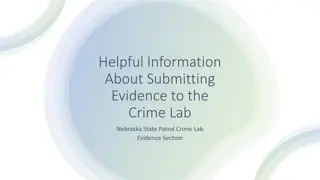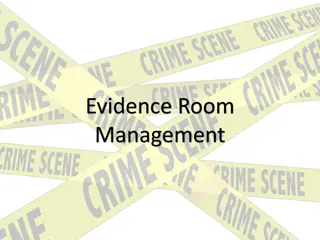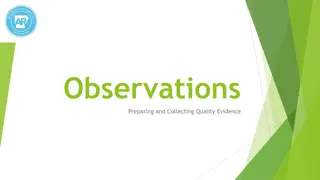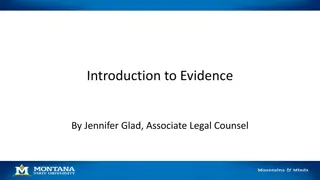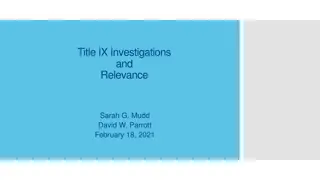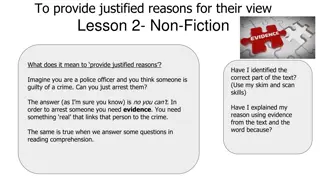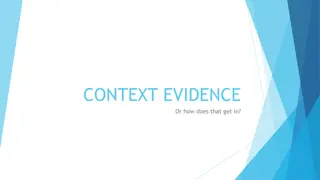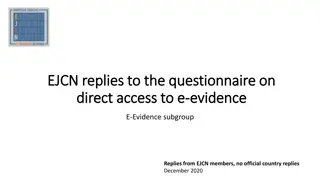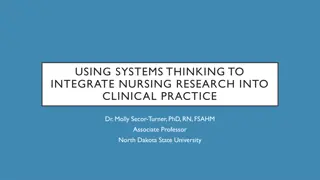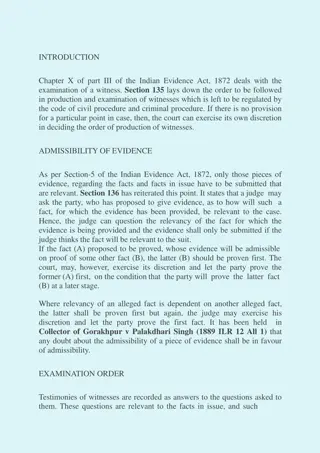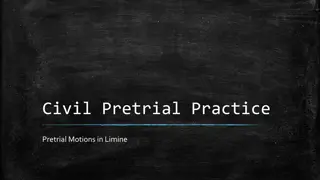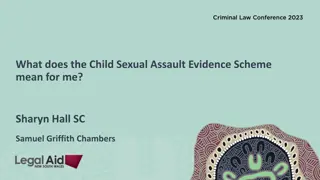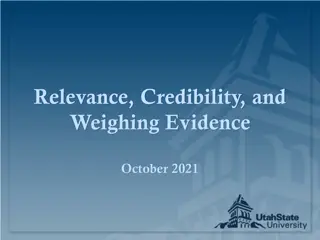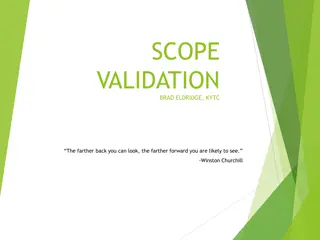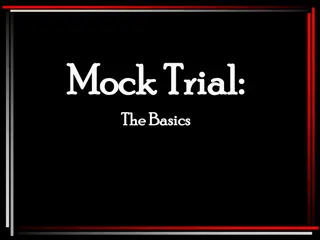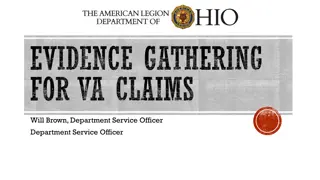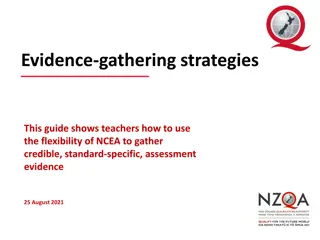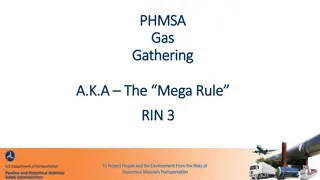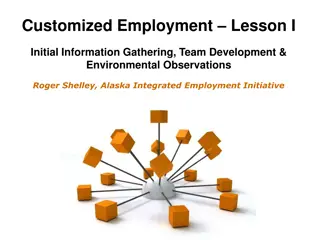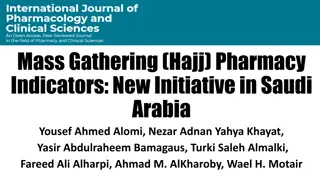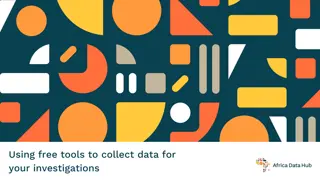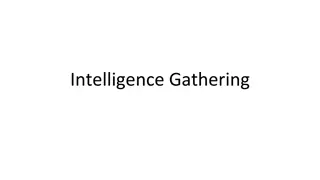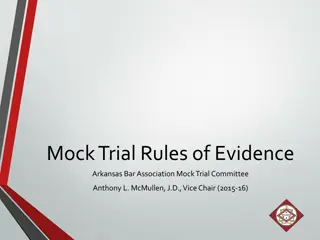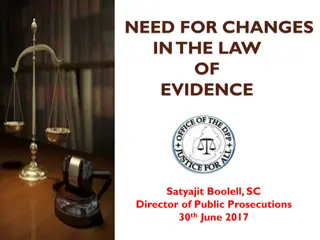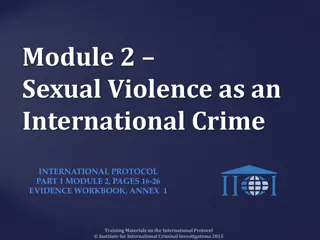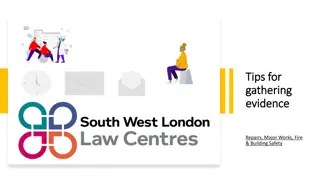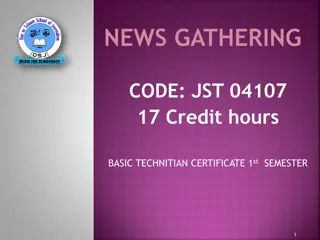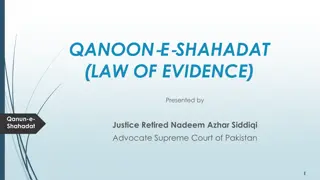The Role of Artifacts and Evidence in Educator Evaluation and Support
Exploring the role of artifacts and evidence in educator evaluation, this content covers the three categories of evidence required by the Oregon Framework. It delves into the efficient process that reduces redundancy, essential components of SLG goals, and the types of evidence relevant to professio
0 views • 15 slides
Understanding Impression Evidence Collection in CSI Investigations
Impression evidence plays a crucial role in investigations, including shoeprints, tool marks, tire tracks, bite marks, and riffling marks on bullets. This evidence can be collected in 2D using photography or tape lifts, and in 3D through casting methods. Differentiating between class and individual
0 views • 21 slides
Helpful Information About Submitting Evidence to the Crime Lab.
Helpful information about submitting evidence to the Nebraska State Patrol Crime Lab's Evidence Section. Learn about the NSP 750 Evidence Submittal Form, submission process, and guidelines for resubmissions. Ensure all necessary details are provided for proper analysis of evidence.
5 views • 16 slides
Illegally obtained evidence
Illegally obtained evidence refers to evidence acquired through unlawful means, such as searches without warrants or extraction under duress. The Fruit of the Poisonous Tree doctrine renders evidence inadmissible if derived from illegally obtained evidence. The Exclusionary Rule prohibits the use of
2 views • 30 slides
Evidence Room Management
Explore the intricacies of evidence room management in a law enforcement setting, including the roles of individuals like Greg Van Buskirk, differences in crime scene management between large and small departments, the distinction between property and evidence, the importance of maintaining chain of
0 views • 8 slides
Enhancing Evidence Collection in Education
Explore the importance of minimizing bias in evidence collection, review different types of evidence, identify strategies to collect quality evidence effectively, understand common biases affecting assessment, and learn to spot and address biased statements. Practice eliminating biased language and
0 views • 11 slides
Understanding Evidence in Investigations
Learn about the principles and types of evidence in investigations, including inculpatory and exculpatory evidence, physical, documentary, demonstrative, and verbal evidence. Explore sources of evidence and the significance of collecting relevant information to ensure a fair investigative process.
0 views • 14 slides
Understanding Title IX Investigations and the Role of Evidence Collection
The purpose of a Title IX investigation is to collect relevant evidence, both inculpatory and exculpatory, to allow for impartial decision-making regarding reported sexual harassment cases. Parties involved must receive sufficient notice and have opportunities to participate, present statements, and
1 views • 32 slides
Providing Justified Reasons in Reading Comprehension
Providing justified reasons in reading comprehension involves using evidence from the text to support one's answer, similar to presenting evidence in a legal case. Just as a police officer needs evidence to make an arrest, readers need textual evidence and the word "because" to support their respons
0 views • 11 slides
Understanding Context Evidence in Legal Proceedings
Context evidence in legal proceedings refers to evidence of acts not charged in the indictment, used to provide a background for understanding specific allegations. This type of evidence is often relied upon by the prosecution to explain events or behaviors that may seem isolated or surprising. It i
1 views • 13 slides
Implementation of Legal Frameworks for Electronic Evidence Gathering
The document provides insights into the legal frameworks governing direct access to electronic evidence in various countries. It covers aspects such as extended searches, access based on lawfully obtained credentials, and online searches. The responses highlight the availability and limitations of i
0 views • 5 slides
Integrating Nursing Research into Clinical Practice with Systems Thinking
Dr. Molly Secor-Turner emphasizes the importance of evidence-based practice (EBP) in nursing. EBP, derived from rigorous research, leads to quality patient outcomes by aligning services with current knowledge. The process involves identifying problems, critiquing evidence, implementing recommendatio
0 views • 21 slides
Examination of Witnesses under Indian Evidence Act, 1872
Chapter X of Part III of the Indian Evidence Act, 1872, outlines the process of examining witnesses, including the order of production and admissibility of evidence. Sections 135 to 141 delve into the rules governing the examination-in-chief, cross-examination, and re-examination of witnesses, empha
2 views • 8 slides
Understanding Pretrial Motions in Limine in Civil Pretrial Practice
Pretrial motions in limine (MIL) play a crucial role in civil pretrial practice by seeking evidentiary rulings in advance to control the introduction of evidence at trial. These motions aim to prevent the admission of irrelevant, inadmissible, or prejudicial evidence and can also facilitate the intr
2 views • 17 slides
Understanding the Child Sexual Assault Evidence Scheme
The Child Sexual Assault Evidence Scheme is a significant initiative that facilitates child sexual assault trials by introducing witness intermediaries and pre-recording of children's evidence. It applies to prescribed sexual offences and mandates specific provisions for hearings and evidence presen
1 views • 16 slides
Empowering Health Decisions and Care through OHDSI Community Collaboration
OHDSI's mission revolves around improving health by empowering a community to generate evidence that enhances health decisions and care. The journey to real-world evidence involves leveraging patient-level data in source systems and establishing reliable evidence. The OHDSI community is dedicated to
0 views • 5 slides
Understanding Evidence-Based Medicine and Clinical Decision-Making
European Patients Academy on Therapeutic Innovation emphasizes the importance of Evidence-Based Medicine (EBM) in providing optimum clinical care. EBM involves systematic review and utilization of clinical research for informed decision-making, benefiting patients in disease management and treatment
7 views • 20 slides
Understanding Relevance, Credibility, and Weighing Evidence in Decision-Making
Explore the importance of relevance and credibility in evidence assessment, the role of hearing panels in evaluating evidence fairly, and the responsibilities they hold. Learn about presenting relevant evidence, policy analysis, and identifying irrelevant evidence to ensure a thorough review process
6 views • 32 slides
Mastering Claims, Evidence, and Warrants for Persuasive Writing
Understanding the concepts of claims, evidence, and warrants is crucial for constructing persuasive arguments. Claims represent positions to persuade, evidence supports claims with facts, and warrants bridge the gap between evidence and claims. An exercise is outlined to help practice forming claims
0 views • 8 slides
Project Scoping and Validation for Successful Project Management
Project scoping involves gathering information, defining key design parameters, and identifying features to meet stakeholder requirements. Validating the project scope helps prevent scope creep and changes, leading to cost reduction and shorter schedules. Steps include resource determination, data g
3 views • 13 slides
Analysis of Gathering Patterns from Trajectories - ICDE 2013
Prevalence of trajectory data due to location acquisition technology enables understanding movement behaviors, group travel patterns, and anomaly detection. Co-travellers patterns like Flocks, Convoys, and Swarms are defined based on group characteristics. Gathering patterns involve events with cong
2 views • 20 slides
Understanding Biased Assimilation and Attitude Polarization in Social Disputes
People with strong opinions on complex social issues tend to interpret evidence in a biased manner, accepting confirming evidence readily while subjecting disconfirming evidence to critical evaluation. This can lead to increased polarization rather than narrowing of disagreement when exposed to the
0 views • 20 slides
Transformation of Quality Assessment Framework in Healthcare
The healthcare quality assessment framework is evolving with a new strategy focused on data-led, people's experiences, care integration, and safety culture. The current framework is transitioning towards a new approach by late 2023, incorporating separate registration and monitoring processes, five
0 views • 14 slides
Understanding the Basics of Mock Trials in the American Justice System
Mock trials in the American justice system involve presenting evidence through witness testimony and physical evidence to help juries or judges determine facts. The process includes witness testimony under oath, examination by attorneys, admission of physical evidence, and closing arguments. The tri
0 views • 38 slides
Understanding Circumstantial Evidence in Legal Proceedings
Circumstantial evidence plays a crucial role in legal proceedings, allowing one to infer facts based on surrounding circumstances rather than direct proof. This type of evidence can be powerful in establishing the guilt or innocence of a person accused of a crime, complementing direct evidence for a
0 views • 39 slides
Understanding Evidence Gathering for VA Claims with The American Legion Department of Ohio
Evidence is crucial for VA claims, and it can come in various forms such as documents, written statements, photos, and video recordings. The framework for evaluating evidence includes factors like relevance, competence, credibility, and weight. Understanding the types of evidence, forms of relevance
0 views • 14 slides
NCEA Evidence-Gathering Strategies for Teachers
This guide explains how teachers can use the flexibility of NCEA to gather credible assessment evidence, tailored to meet student needs. It emphasizes the importance of integrating assessment with learning, producing valid evidence, and ensuring fairness and transparency in assessment practices. Tea
0 views • 19 slides
PHMSA Gas Gathering Regulations Update
The PHMSA Gas Gathering regulations, also known as The Mega Rule, have been updated to include new types of regulated onshore gathering. The definition of gathering has been expanded to encompass additional requirements for operators, such as using API RP 80 1st edition. New types of gathering, incl
0 views • 11 slides
Customized Employment Lesson I: Initial Information Gathering & Team Development
Dive into the foundational stages of customized employment with a focus on information gathering, team development, and environmental observations. Explore tools and templates such as the Discovery Staging Record to streamline the process, along with key considerations for community-based informatio
0 views • 15 slides
Mass Gathering Hajj Pharmacy Indicators: New Initiative in Saudi Arabia
This initiative in Saudi Arabia focuses on driving national mass gathering pharmaceutical programs at Hajj. The project includes guidelines, a business model, project management, and monitoring phases to improve pharmacy services during mass gatherings. The project aims to enhance clinical and econo
1 views • 4 slides
Data Gathering Essentials: Tools, Techniques, and Best Practices
Data gathering is a crucial process involving collecting, compiling, and organizing information from various sources. This presentation covers the fundamentals of data gathering, the role of technology in the process, and the importance of data in investigative reporting. Practical insights on digit
0 views • 42 slides
Comprehensive Guide to Intelligence Gathering and Penetration Testing Stages
Understanding the importance of intelligence gathering in security and the stages of penetration testing - information gathering, scanning, exploitation, and reporting. Delve into tools like nslookup for server information and leverage Google Dorks for database vulnerabilities. Safeguard your system
0 views • 4 slides
Understanding Mock Trial Rules of Evidence
Mock Trial Rules of Evidence are crucial for determining the admissibility of testimony and evidence in a trial setting. Students preparing for cases need to assess evidence admissibility, make timely objections, and be prepared to defend testimony. The rules cover objections, specific objections ty
0 views • 36 slides
Need for Changes in the Law of Evidence: Perspectives and Reforms
Information by which facts are proved forms the essence of the law of evidence, regulating how facts are established in courts. This article discusses the exclusionary ethos, statutory reforms, challenges with hearsay evidence, and examples of reforms from different countries like England, Wales, Au
0 views • 18 slides
Understanding International Crimes: Elements, Definitions, and Evidence
International crimes encompass acts like crimes against humanity, war crimes, and genocide, with various legal elements to establish accountability. To substantiate such crimes, individuals must prove contextual, linkage, and specific elements. Evidence of sexual violence is crucial in proving these
1 views • 20 slides
Essential Tips for Gathering Evidence in Building Safety Matters
Learn key strategies for collecting evidence related to repairs, major works, fire incidents, and building safety. Explore the EIRC method for evidence collection, understand the importance of proof in documenting issues like heating system breakdowns, and discover response times for various repair
0 views • 15 slides
Evidence Gathering and Client Support Strategies in Clinics
This content delves into the importance of gathering evidence on how clients find out about clinics, the routes they take to reach the clinic, existing support or information sources, and the time taken for clients to receive help. It also explores evidence on when people seek help from the clinic,
0 views • 7 slides
Essential Concepts in News Gathering and Reporting
Explore the fundamental aspects of news gathering and journalism, covering topics such as interviewing skills, different news sources, and information gathering techniques. Delve into the definition of news and its significance in society according to various scholars and media professionals. Gain i
0 views • 57 slides
Practice and Procedure in Judicial Review: Factual Evidence and Interveners
The content provides valuable insights into the practice and procedure regarding factual evidence and interveners in judicial review cases. It covers general rules, recent cases, applications for oral evidence, questioning witnesses, opinion evidence, and the role of interveners. Key points include
0 views • 28 slides
Understanding Qanun-e-Shahadat: Law of Evidence in Pakistan
Qanun-e-Shahadat Order 1984 replaced the Evidence Act of 1872 in Pakistan, aiming to align the law of evidence with Islamic principles. This law is crucial for judicial proceedings, governing the admissibility of oral and documentary evidence, primary and secondary evidence, and resolving conflicts
0 views • 22 slides


